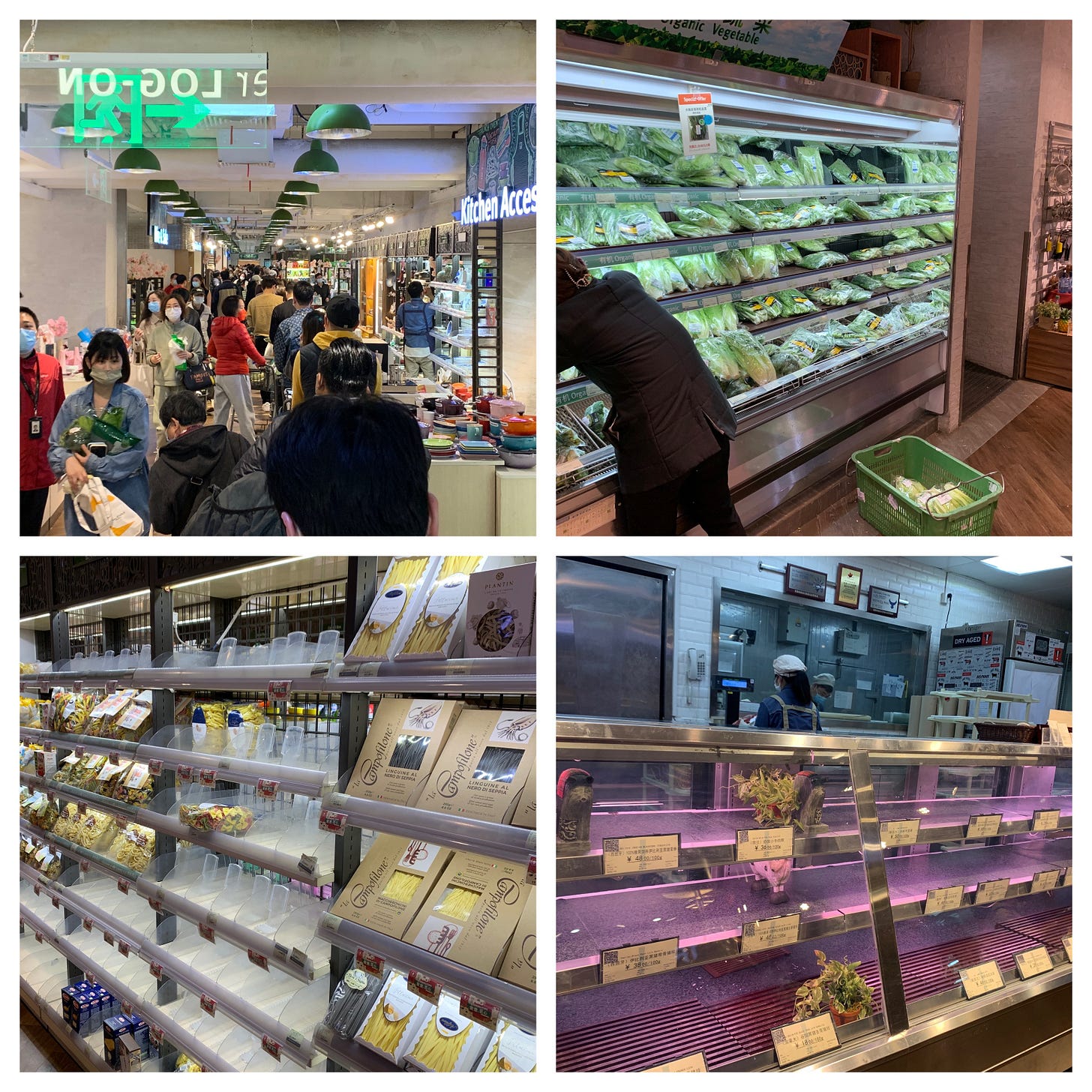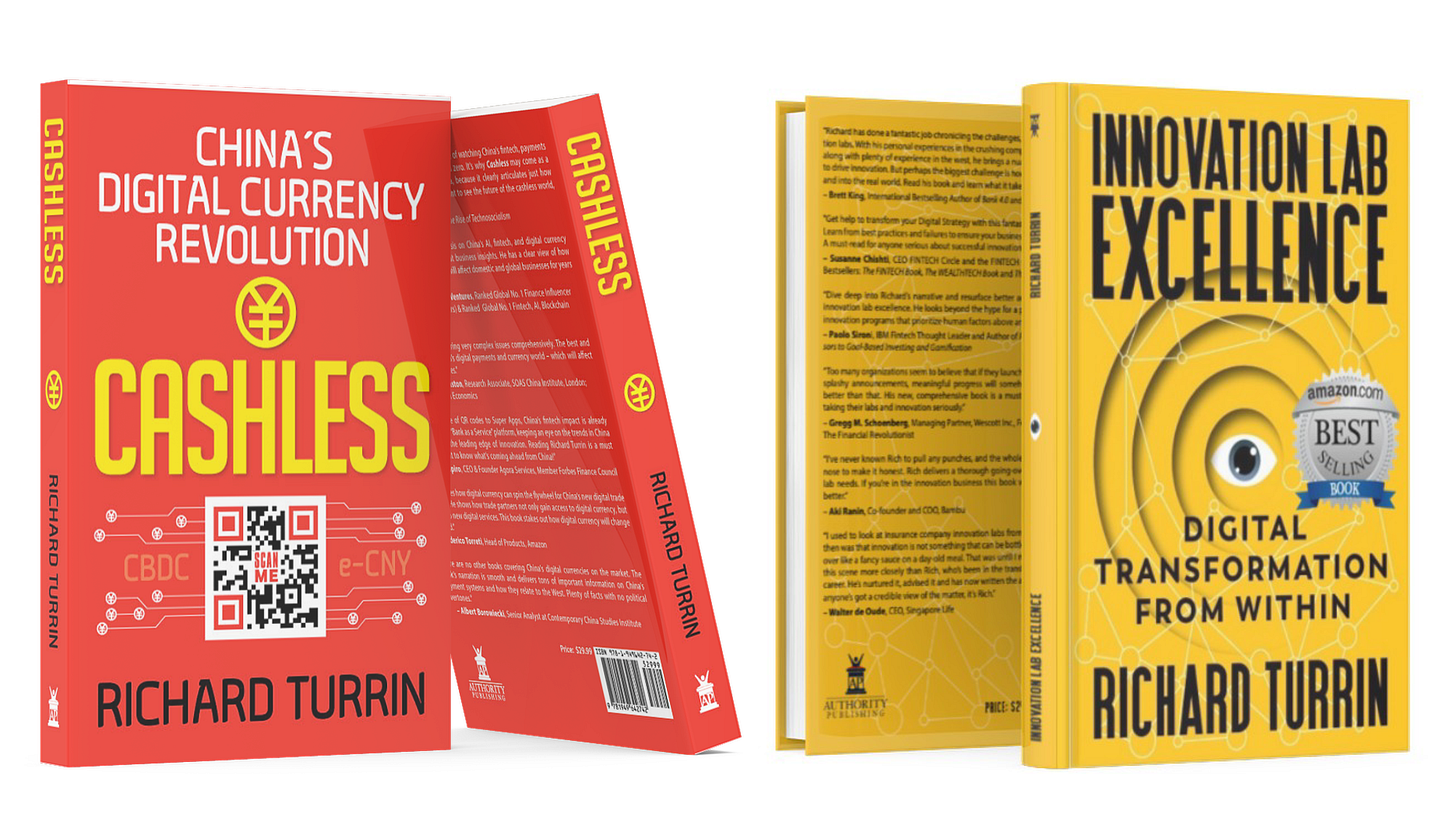SPECIAL SHANGHAI LOCKDOWN EDITION: Pictures from lockdown!
Digital Euro, US eCash Act, Alibaba accepts WeChat Pay and the yuan as a reserve currency!
SPECIAL SHANGHAI LOCKDOWN EDITION: Pictures of lockdown! The digital euro takes shape while the US looks at private eCash. China Alibaba does the unthinkable and accepts WeChat Pay. So can China's yuan as a reserve currency, and a great new video!
Friends this is my first newsletter on Substack, for now it is identical to my Linkedin newsletter. The gameplan is to slowly move my long form content to substack. Yes, I will still write on Linkedin, have no fear I love the platform. But long-form content on Linkedin is a disaster. Let me give you two examples:
First my newsletter was taken down for a week under suspicion I promote cryptocurrency sales. I had to explain that CBDC was not crypto but Linkedin would not listen. It took 6 days.
Second, this newsletter got 1500 views on Linkedin after about 1.5 hours. Then the algo kicked in. By morning 10 hours later it had 2,000. What do you think happened? Simple, the algo decided it shouldn’t be seen. Why? We will never know, the algo explains to no one.
1. Lockdown day three
Friends are writing to me and asking if I'm OK and have food! Frankly, I can't blame them, as some of the reporting on Shanghai's COVID I've read online makes it seem that the city is descending into chaos. But, frankly, it doesn't seem that way to my friends living in other parts of the city or me.
On day three, my impression is that the entire quarantine process is reasonably well managed. Community groups are pitching in to ensure everyone is tested and support systems seem to be functioning. That said, Shanghai is a megacity with 25 million inhabitants, and the experience across the city will undoubtedly vary.
I didn't have trouble buying food before going into lockdown. Yes, some of my supermarket's shelves were cleaned out by the last day before lockdown. Meat and eggs seemed hardest hit, but there was certainly food available. It wasn't like a zombie apocalypse movie. And no, I witnessed no fights over food, just people queuing up to pay. My neighbors are also calm, resigned to staying home and no one seems distraught or bothered. It is all relatively uneventful.
Clockwise: In my local supermarket the day before lockdown, the checkout line was insane, greens were plentiful, pasta was also available, but the meat counter was sold-out. I was lucky my freezer was full!
The heroes of lockdown are the local volunteers for our building who distributed free food parcels to the apartments and organized our COVID testing. They did a great job and a great public service.
Clockwise: Free food delivered by volunteers. Skies are "Lockdown Blue" due to no cars and empty streets. Volunteers getting ready for testing, and testing day.
So I'm sorry to report that things are well, boring! Lockdown means I have more time to write, which I suppose is good, but it seems writing is more challenging than ever without my yoga class and a walk outside to clear my head!
This is, of course, our second lockdown, and it is far more strict than the first six days that we had a bit more than a week ago. The first lockdown, which had many varying degrees of quarantine, allowed us to leave our homes and walk in the garden. This time we're at home and asked not to go out.
The first lockdown was less strict and by community rather than the entire city. It became hard to know how many days we needed to stay at home.
I'll leave the debate over China's zero covid policy for another day. I understand that there are differing views on its effectiveness. I just see this as doing my part to help slow the spread into vulnerable elderly and rural communities. We should all hope that this second lockdown is successful. Shanghai’s massive ports and contribution to the global economy mean that further extended lockdowns will have a global impact.
2. The EU's vision for a digital euro takes shape while the US looks at eCash
First, let me congratulate the EU for actually surveying citizens to get an idea of their concerns for the digital euro. The Fed should watch and learn from the European Central Bank (ECB)! They might learn that asking people what they want in a digital currency is insightful. That's asking a lot from the Fed, who historically could care less what the people want.
The most shocking thing we learned is that privacy is, amazingly enough, not "top of mind" for most users, many of whom feel that much of their purchasing is already tracked. That was a real shocker for me and apparently for the ECB. Still, it shows the sad state of digital privacy.
Interestingly, free and immediate contactless payment seemed to be a hit, provided it was universal. Users don't want to worry about whether or not it would be accepted. They have had their fill of being told: "Sorry, we accept Visa, not Mastercard." The good news is that universal acceptance is precisely the experience a CBDC national currency can deliver.
Read more on the ECB digital euro user survey in my post here and see the PDF with survey results here.
What makes this so interesting is that in the same week that the EU launched these results, US Senators from the Financial Services Committee published a draft law proposing privacy-protecting eCash!
ECash is tokenized money that does not get transported on a network. It is not a CBDC! ECash is a token on your phone or offline card and can be used as we do cash with no risk of being tracked. I think it's a great idea and may just compliment a CBDC. CBDCs would cover higher value transactions and eCash lower day-to-day expenses. This looks almost exactly like the e-CNY's anonymous payment for low value (RMB 2000 max) transactions.
eCash is designed for privacy. Lack of AML/KYC is its "Achilles heel."
eCash is not without flaws. Suppose you lose your digital wallet; it's gone, just like cash. The biggest issue is that eCash requires no KYC or AML. I don't see this as a flaw, in fact, I love it! Still, I am sure this will cause a battle with regulators who will deem eCash unacceptable. Still, I think it advances the digital dollar discussion.
Read more about the eCash act and PDF of the full act in my post here.
What makes this so interesting is that the US is investigating a privacy-protecting eCash system, while the ECB is getting actual survey results saying that privacy is not the number one concern. I find the divergence interesting. It makes me wonder if the nation addicted to privacy vampire Facebook is as concerned about privacy as a vocal minority makes them out to be? In the EU, we now know that this is not a primary concern. Sadly, for the US, we have no idea.
3. The Digital Yuan is used for far more than buying coffee
Now in the podcast video below, I drop the following "truth bomb" at 26:50:
"There is a crisis of imagination with CBDCs! We need to understand that CBDCs can do so much more than buy a cup of coffee. We have 5G, IoT, and smart contracts. We are going to live in a world where "machines pay." CBDC will give us new use cases that people can't even think of now!"
Thank you to Radek Pyffel for this great interview in support of the Polish edition of Cashless! Note that we are holding up different versions of Cashless.
For the video and a complete timestamp of questions and answers go to my post here.
I back this statement up with a post earlier in the week that shows how the e-CNY is being used for transactions over US$ 100,000 in trials in China. The PBOC is clearly signaling that e-CNY will be used to carry large sums of money that WeChat and Alipay were never designed to move. Moreover, it proves that the e-CNY can do far more than buy coffee.
I have a PDF showing some of these high-value transactions on my post here.
And this is a problem that I think I need to address on Linkedin in the coming weeks. The discussion around CBDC is still centered on doing things you can do with a credit card today, like buying coffee. There seems to be little recognition that 5G, IoT, and smart contracts will fundamentally change payment in ways that we cannot imagine. CBDCs aren't about you buying a coffee but are designed to usher in a future where machines pay.
4. The Chinese yuan as a reserve currency?
This is a big question but has to be asked. While the yuan certainly has many flaws, is it "good enough?" The US dollar was once considered "risk-free," but it now has real questions surrounding its usability following widespread global sanctions. Can you use it if sanctions hit? This is why as a "risk management exercise," many nations are looking for dollar replacements, and the yuan just might be "good enough." It's not a question of loving the yuan, so much as that there are few alternatives, and most countries import goods from China. So why wouldn't they convert some of these purchases to yuan to reduce dollar dependence?
My post on the yuan as a reserve currency
5. The unthinkable! Alibaba accepts WeChat Pay
In the last bit of news for the week, the unthinkable finally occurs as the "walled gardens" of WeChat and Alibaba are broken down block by block. This week a new feature is being rolled out on Alibaba that allows users of WeChat Pay to make a payment. That's excellent news and shows progress in making payment more universal in China. People welcome the removal of these walls.
A full rundown on Alibaba accepting WeChat Pay here.
Thank you for reading!
Thoughts?
Rich Turrin is the international best-selling author of "Cashless - China's Digital Currency Revolution" and "Innovation Lab Excellence." He is an Onalytica Top 100 Fintech Influencer and an award-winning executive previously heading fintech teams at IBM following a twenty-year career in investment banking. Living in Shanghai for the last decade, Rich experienced China going cashless first-hand. Rich is an independent consultant whose views on China's astounding fintech developments are widely sought by international media and private clients.










